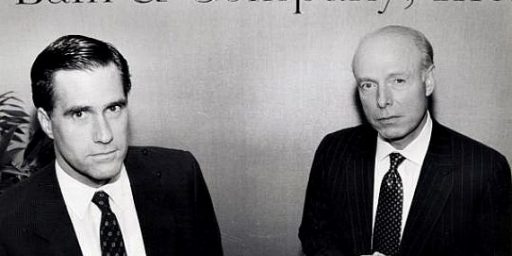Creative Destruction
George Will notes that both parties are guilty of lying–or outright ignorance–about jobs:
It is difficult to say something perfectly, precisely false. But Speaker Dennis Hastert did when participating in the bipartisan piling-on against the president’s economic adviser who imprudently said something sensible.
John Kerry and John Edwards, who are not speaking under oath and who know that economic illiteracy has never been a disqualification for high office, have led the scrum against the chairman of the president’s Council of Economic Advisers, N. Gregory Mankiw, who said the arguments for free trade apply to trade in services as well as manufactured goods. But the prize for the pithiest nonsense went to Hastert: “An economy suffers when jobs disappear.”
So the economy suffered when automobiles caused the disappearance of the jobs of most blacksmiths, buggy makers, operators of livery stables, etc.? The economy did not seem to be suffering in 1999, when 33 million jobs were wiped out — by an economic dynamism that created 35.7 million jobs. How many of the 4,500 U.S jobs that IBM is planning to create this year will be made possible by sending 3,000 jobs overseas?
Hastert’s ideal economy, where jobs do not disappear, existed almost everywhere for almost everyone through almost all of human history. In, say, 12th-century France, the ox behind which a man plowed a field changed, but otherwise the plowman was doing what generations of his ancestors had done and what generations of his descendants would do. Those were the good old days, before economic growth.
The disappearance of whole categories of jobs can be desirable for reasons other than economic rationality. The economist Irwin Stelzer recalls that John L. Lewis, the firebreathing leader of the United Mine Workers of America from 1920 to 1960, once said that he hoped to see the day when no man would make his living by going underground.
For the highly competent work force of this wealthy nation, the loss of jobs is not a zero-sum game, it is a trading up in social rewards. When the presidential candidates were recently in South Carolina, histrionically lamenting the loss of textile jobs, they surely noticed the huge BMW presence. It is the “offshoring” of German jobs because Germany’s irrational labor laws, among other things, give America a comparative advantage. Such economic calculation explains the manufacture of Mercedeses in Alabama, Hondas in Ohio, Toyotas in California.
Exactly. Economists refer to this process as “creative destruction” and, in the aggregate, it’s a good thing. As Joseph A. Schumpeter observed in 1942,
The opening up of new markets, foreign or domestic, and the organizational development from the craft shop and factory to such concerns as U.S. Steel illustrate the same process of industrial mutation—if I may use that biological term—that incessantly revolutionizes the economic structure from within, incessantly destroying the old one, incessantly creating a new one. This process of Creative Destruction is the essential fact about capitalism. It is what capitalism consists in and what every capitalist concern has got to live in. . . .
***
But in capitalist reality as distinguished from its textbook picture, it is not [mere price competition between firms] which counts but the competition from the new commodity, the new technology, the new source of supply, the new type of organization (the largest-scale unit of control for instance)—competition which commands a decisive cost or quality advantage and which strikes not at the margins of the profits and the outputs of the existing firms but at their foundations and their very lives. This kind of competition is as much more effective than the other as a bombardment is in comparison with forcing a door, and so much more important that it becomes a matter of comparative indifference whether competition in the ordinary sense functions more or less promptly; the powerful lever that in the long run expands output and brings down prices is in any case made of other stuff.
It is hardly necessary to point out that competition of the kind we now have in mind acts not only when in being but also when it is merely an ever-present threat. It disciplines before it attacks. The businessman feels himself to be in a competitive situation even if he is alone in his field or if, though not alone, he holds a position such that investigating government experts fail to see any effective competition between him and any other firms in the same or a neighboring field and in consequence conclude that his talk, under examination, about his competitive sorrows is all make-believe. In many cases, though not in all, this will in the long run enforce behavior very similar to the perfectly competitive pattern.
Indeed.
The aggregate result of this process is fantastic and has radically increased the standard of living of societies which allow it to flourish. We live in a society where the lowliest unskilled laborer has a better lifestyle than did Louis XIV or Henry VIII. A society in which the greatest health threat is obesity is a great one, indeed. Recognizing the fact that competition makes the overall economy thrive is not the same as claiming that each individual worker is enriched. Clearly, there are whole segments of the economy that existed when I was a kid–or even a decade ago–where Americans can simply no longer make a living. And it’s not as if Bill Gates will be hiring gas station attendants displaced by electronic self-service pumps. It’s legitimate to try to come up with government solutions to bridge that gap; but we shouldn’t pander to the irrational impulses of those people by claiming we’re going to protect their jobs. If a job can be done more efficiently by an illiterate Third World peasant or a robot, there’s little we can do about that in the long run.
Dodd Harris has some thoughts on this as well.
Matthew Yglesias argues that Republican voters are more likely to be protectionists than their Democratic counterparts. Dan Drezner disagrees and wants you to explain why while he’s traipsing around Indiana.






I’ve never heard of ‘creative destruction’ but I find it very interesting.
Economics is wildly theoretical, no one is completely wrong.
I have always assumed all the chatter about protectionism has been a kind of warning to our trade partners who aren’t delivering as much as they are taking. I have found all the recent chatter very pleasant and appropriate.
One could argue that it has been effective, last year China finally bought a signifigant amount of US goods after a 3 year ditch.
It’s always a matter of how close to you the job is that’s moved off-shore, whose ox is getting gored. As a software developer, I’m living under the off-shore cloud for the first time in my life.
On the other hand, my small-town Texas upbringing, reinforced by my Naval career, has instilled a sense of some things being larger and more important than one’s self. If the circumstances have changed, you’d better change yourself to match them. Personalizing it, I’ve got to find a way to make myself more valuable than my competing software developer in India/Russia/China/Ireland/BFE or wherever.
I’m one of those people that work from home who will eventually be replaced by folks overseas who can do the job cheaper. I KNOW this, and have figured out YEARS ago that if I could telecommute to a job in the Northeast from Florida, somebody else could do it from India. It is not a big surprise, and I an using the present flexibility in my schedule to get some training/education for my next career.
It is amazing how many people do not understand the concept that THEY are responsible for their employment and economic well being, not some corporation. If I lose MY job and am in severe economic straits because I have not kept myself employable, then that would be MY fault.
Few of us seem to want to acknowledge that the internet funny money scheme had a lot to do with that explosion of jobs in the 90s. The collapse of that pyramid scheme made a whole lot of jobs evaporate.
A couple of questions. Is it really the job of the president to manufacture jobs? I doubt it. Doesn’t even seem like a good idea to me.
Should we create another funny money scheme in order to create more jobs, or should we settle back and wait for the market to create more sustainable jobs that produce products that people actually want to buy?
Outsourcing/Offshoring is killing the U.S. Economy. It is creating High Unemployment,
continuing the longest Recession since WW2, and eroding the Tax Base at an alarming pace.
All H-1b Visas and L1-b Visas must be repealed. These laws have legalizing the export of thousands of highly paid ‘white collar jobs’
to countries where workers are paid a fraction of America wages and don’t pay taxes.
These policies are exporting the ‘American Way of Life’ and selling out the
‘Future of the Next Generation of Americans’.
The last time this policy of Fair Trade was attempted in the United States was back in 1890.
The Fair Trade Experiement ended in 1929 with the Stock Market Crash, Great Depression, and the Banking Panic.
Since then, regulations were legislated into law to prevent against another Economic Collapse of this magnatude
but these regulations have been lifted through De-Regulation Laws in the past 10 years.
And if this megatrend is allowed to continue, another Economic Collapse or Revolution is inevitable.
The New Business Model “Employ Cheap Foreign Workers while charging High American Prices” has already started to fail.
Gains are only seen on Wall Street and the profits never trickle down. CEOs believe ‘Greed Is Good’ and they practice it
every day when they ‘Downsize’ their companies, ‘Offshore’ American Jobs, and give themselves huge bonuses.
Corporate executives never re-invest their companies profits. ‘Downward Mobility’ will become commonplace in America
in the next 5 years.
CEOs can not control their Greed. Only strong legislation against Offshoring will stop the negative effects of this business practice.
It’s call Regulation and it’s what existed before Re-Regulation came along.
Unless this is stopped, all Americans in all walks of life will be doomed to working at lower paying jobs at places like ‘Home Depot’ or ‘Burger King’.
Outsourcing/Offshoring is killing the U.S. Economy. It is creating High Unemployment,
continuing the longest Recession since WW2, and eroding the Tax Base at an alarming pace.
All H-1b Visas and L1-b Visas must be repealed. These laws have legalizing the export of thousands of highly paid ‘white collar jobs’
to countries where workers are paid a fraction of America wages and don’t pay taxes.
These policies are exporting the ‘American Way of Life’ and selling out the
‘Future of the Next Generation of Americans’.
The last time this policy of Fair Trade was attempted in the United States was back in 1890.
The Fair Trade Experiement ended in 1929 with the Stock Market Crash, Great Depression, and the Banking Panic.
Since then, regulations were legislated into law to prevent against another Economic Collapse of this magnatude
but these regulations have been lifted through De-Regulation Laws in the past 10 years.
And if this megatrend is allowed to continue, another Economic Collapse or Revolution is inevitable.
The New Business Model “Employ Cheap Foreign Workers while charging High American Prices” has already started to fail.
Gains are only seen on Wall Street and the profits never trickle down. CEOs believe ‘Greed Is Good’ and they practice it
every day when they ‘Downsize’ their companies, ‘Offshore’ American Jobs, and give themselves huge bonuses.
Corporate executives never re-invest their companies profits. ‘Downward Mobility’ will become commonplace in America
in the next 5 years.
CEOs can not control their Greed. Only strong legislation against Offshoring will stop the negative effects of this business practice.
It’s call Regulation and it’s what existed before Re-Regulation came along.
Unless this is stopped, all Americans in all walks of life will be doomed to working at lower paying jobs at places like ‘Home Depot’ or ‘Burger King’.